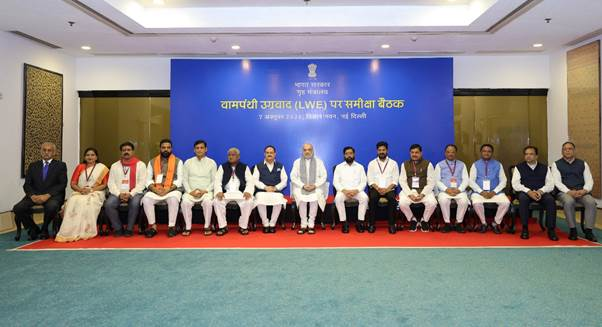Union Home Minister and Minister of Cooperation, Shri Amit Shah, chaired a high-level review meeting in New Delhi today to discuss strategies for combating Left Wing Extremism (LWE). The meeting brought together the Chief Ministers of Chhattisgarh, Madhya Pradesh, Maharashtra, Odisha, and Telangana, along with the Deputy Chief Minister of Bihar and the Home Minister of Andhra Pradesh. Senior officials, including the Union Home Secretary, Director of the Intelligence Bureau, Deputy National Security Advisor, and representatives from the Central Armed Police Forces (CAPFs), were also in attendance.
Commitment to Eradication of Naxalism
In his opening remarks, Amit Shah emphasized the government's commitment, under Prime Minister Narendra Modi's leadership, to eliminate Naxalism by March 2026. He stressed that the goal of a developed India must include equitable development for all citizens, particularly the 8 crore tribal population disproportionately affected by LWE. He pointed out that Naxalism hinders access to essential services such as education, healthcare, and connectivity, thus obstructing development in remote and tribal areas.
Significant Progress and Future Plans
Shah highlighted significant achievements in the fight against Naxalism since 2019, including a historic reduction in casualties to below 100 in 2022 for the first time in 30 years. He noted a 53% decline in violent incidents related to Naxalism and a 70% reduction in deaths among civilians and security personnel. The Minister also mentioned the neutralization of 14 top Naxal leaders and the success of welfare schemes that reached the most marginalized communities.
The Minister detailed the government's multi-pronged strategy, which includes the establishment of over 194 CAPF camps, enhancing police presence with 544 fortified police stations, and improved mobility for security forces through the deployment of 12 helicopters. The government has also invested heavily in road construction, mobile connectivity, and educational initiatives, with 216 Eklavya Model Residential Schools established over the past decade.
Appeals to Youth and Enhanced Funding
Shah appealed to youth involved in Naxalism to renounce violence and join the mainstream, citing over 13,000 individuals from conflict-affected areas who have embraced peace. He assured them of government rehabilitation schemes designed to facilitate their transition into productive members of society.
The Union Home Minister highlighted the increase in funding for security measures, with the Modi government raising security-related expenditures from Rs 1,180 crore (2004-2014) to Rs 3,006 crore (2014-2024). He called for a monthly review of development progress and anti-Naxal operations by Chief Ministers and bi-weekly reviews by Police Directors General.
Conclusion and Call for Collective Action
Amit Shah concluded the meeting by urging state leaders to collaborate closely with the central government to eradicate Naxalism completely by 2026. He reiterated that once Naxalism is defeated, development can flourish without human rights violations or violence. The Home Minister's call to action emphasizes the urgency of collective efforts in overcoming one of India's most significant challenges to tribal and rural development.











